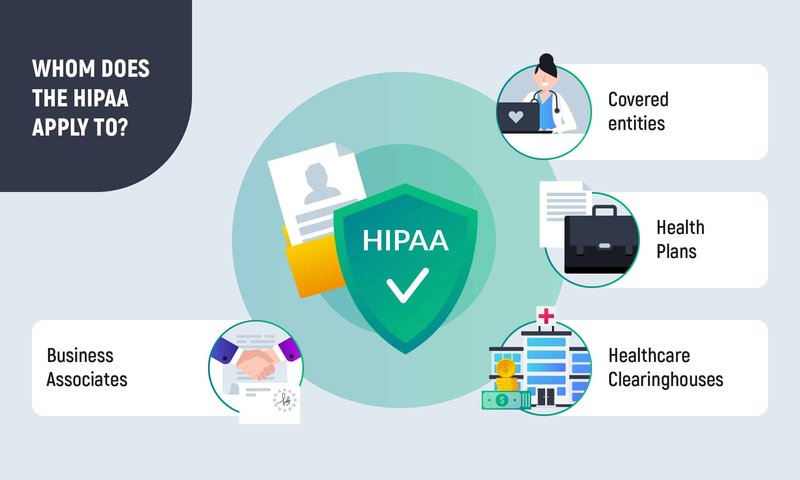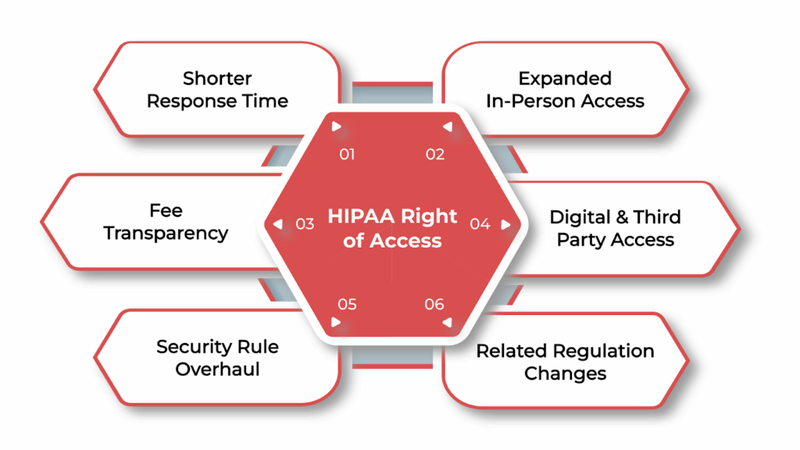Who Does HIPAA Apply To? Your Complete Guide to Understanding Healthcare Privacy Laws


Protecting your health information isn't just important, it's the law. But do you know who's required to follow HIPAA rules when handling your medical data?
What Is HIPAA and Why Should You Care?

The Health Insurance Portability and Accountability Act (HIPAA) isn't just another government regulation gathering dust on a shelf. It's your personal shield against unauthorized access to your most private health information. Enacted in 1996, HIPAA has evolved into one of the most critical privacy laws affecting millions of Americans every day.
Think about it: your medical records contain incredibly sensitive details about your mental health, chronic conditions, prescription medications, and personal struggles. Without proper protection, this information could fall into the wrong hands, potentially affecting your job prospects, insurance coverage, or personal relationships.
The Three Main Players: Who Must Follow HIPAA Rules?
HIPAA doesn't apply to everyone who handles health information. Instead, it focuses on three specific categories of entities that have direct access to your protected health information (PHI).
Covered Entities: The Primary Guardians
Healthcare Providers: These are the professionals and organizations you interact with directly for medical care. Whether you're visiting your family doctor for a routine checkup or receiving emergency treatment at a hospital, these providers must protect your information:
- Doctors, nurses, and specialists
- Hospitals and medical centers
- Clinics and urgent care facilities
- Dentists and orthodontists
- Chiropractors and physical therapists
- Mental health counselors and psychiatrists
- Pharmacies and pharmacists
- Nursing homes and assisted living facilities
Important note: Only healthcare providers who transmit health information electronically in connection with certain transactions are covered. A small practice that operates entirely on paper may not be subject to HIPAA.
Health Plans: Your insurance coverage connects you to a complex network of entities that must safeguard your information:
- Private health insurance companies
- Medicare and Medicaid programs
- Health maintenance organizations (HMOs)
- Employer-sponsored group health plans
- Government health programs for federal employees
- Multi-employer health plans
Healthcare Clearinghouses: These behind-the-scenes players process your health information between providers and health plans:
- Billing services that process claims electronically
- Community health management information systems
- Organizations that convert medical data between different formats
Business Associates: The Extended Network
Business associates are third-party organizations that work with covered entities and need access to protected health information to perform their services. This category has expanded significantly since HIPAA's inception, reflecting how interconnected modern healthcare has become.
Technology and IT Services
- Electronic health record (EHR) vendors
- Cloud storage providers hosting medical data
- IT support companies maintaining healthcare systems
- Software developers creating healthcare applications
Administrative and Support Services
- Medical billing companies
- Claims processing organizations
- Legal firms representing healthcare providers
- Accounting firms handling healthcare finances
- Consultants analyzing healthcare operations
Communication and Marketing
- Email service providers for healthcare organizations
- Patient communication platforms
- Marketing agencies working with healthcare clients
- Translation services for medical documents
Subcontractors: The Extended Reach
When business associates hire their own contractors to help with HIPAA-covered work, those subcontractors also become part of the compliance chain. This creates a comprehensive network of protection around your health information.

Who Isn't Covered by HIPAA? Common Misconceptions
Understanding who HIPAA doesn't cover is just as important as knowing who it does. Many people assume HIPAA provides universal protection, but several significant gaps exist:
Employers Your boss generally isn't bound by HIPAA when it comes to health information they receive directly from you. However, if your employer sponsors your health plan, they must follow HIPAA rules for information they receive from that plan.
Life Insurance Companies When you apply for life insurance, the medical information you provide isn't protected by HIPAA. These companies operate under different privacy regulations.
Schools and Educational Institutions Student health records at schools are typically protected by FERPA (Family Educational Rights and Privacy Act), not HIPAA, even when schools provide health services.
Law Enforcement Police departments and other law enforcement agencies aren't covered entities, though they may receive protected health information under specific circumstances outlined in HIPAA.
Fitness Apps and Wellness Programs That fitness tracker on your wrist or the wellness app on your phone? Most aren't covered by HIPAA, even though they collect health-related data. They may be subject to other privacy laws, but HIPAA generally doesn't apply.
Real-World Scenarios: HIPAA in Action
Scenario 1: Your Annual Physical When you visit your doctor for an annual checkup, multiple HIPAA-covered entities are involved. Your doctor (healthcare provider) examines you and updates your electronic health record (business associate manages the EHR system). Your insurance company (health plan) processes the claim, and a medical billing service (business associate) handles the paperwork.
Scenario 2: Emergency Room Visit During an emergency room visit, the hospital (covered entity) treats you, your insurance processes the claim (health plan), and various specialists may be consulted (healthcare providers). If the hospital uses an external radiology service to read your X-rays, that service becomes a business associate.
Scenario 3: Prescription Pickup When you fill a prescription, the pharmacy (covered entity) must protect your information. If they use a delivery service specifically contracted to handle medical deliveries, that service becomes a business associate. However, if you simply have the medication delivered through a general courier service, different rules may apply.
Your Rights Under HIPAA
Understanding who HIPAA applies to helps you exercise your rights more effectively:
Access Rights: You can request copies of your medical records from any covered entity that has them.
Amendment Rights: If you find errors in your health information, you can request corrections.
Accounting Rights: You can ask for a list of who has accessed your protected health information.
Restriction Rights: You can request limitations on how your health information is used or shared.
Confidential Communication: You can ask to receive health information through alternative means or at alternative locations.
Red Flags: When HIPAA Violations Occur
Knowing who should follow HIPAA helps you identify potential violations:
- A covered entity shares your information without authorization
- A business associate fails to secure your health data properly
- Healthcare staff discusses your case inappropriately in public areas
- Medical records are disposed of improperly
- Unauthorized individuals gain access to your health information
Conclusion
HIPAA's reach extends far beyond your doctor's office. In today's digital healthcare environment, your protected health information travels through a complex network of covered entities, business associates, and subcontractors. Each link in this chain has legal obligations to protect your privacy.
By understanding who HIPAA applies to, you're better equipped to:
- Ask the right questions about how your information is protected
- Identify potential privacy violations
- Exercise your rights effectively
- Make informed decisions about sharing your health information
Your health information is deeply personal, and HIPAA provides a robust framework for protecting it. While the law isn't perfect and doesn't cover every situation, it creates meaningful protections for millions of Americans navigating the complex healthcare system.
Remember: when in doubt about whether an organization should be protecting your health information under HIPAA, don't hesitate to ask. You have every right to understand how your most sensitive personal information is being handled, stored, and shared.
Still wondering who does HIPAA apply to? Regulance AI is here to solve all your compliance problems. Contact us now to unlock exclusive solutions tailored just for you.